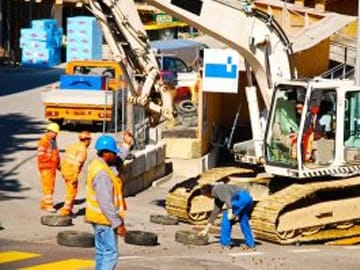
Restrictive terms of Industrial Disputes Act leads to contract labour
In India, the reasons for engagement of contract labour are due to the restrictive conditions of Chapter VB of the Industrial Disputes Act. This Act mandates that any factory employing more than 100 workmen would require prior permission for lay-off, retrenchment and closure. Contract labour is on the rolls of the contractor and does not figure in the headcount of the permanent employees working in the company.
The need for flexibility and ease of separation has made this an attractive option for companies. The numbers are thus soaring and many organisations not just have an equivalent number of contract labourers as permanent workmen, but even 10 times more. The reluctance to add to the permanent workforce is also very high considering the high costs companies are incurring to separate them. Glaxo Smithkline in Mumbai paid up to Rs 45 lakh as VRS and Raymonds paid at Thane, where it closed operations, of amounts up to Rs 21 lakh.
While the number of permanent workmen in companies may be shrinking, fortunes of companies like Team Lease, Addeco, Sodexo, Group 4 Securities, Kelly, have been booming and they engage huge number of employees working in companies, doing jobs which are of a perennial nature.
The Contract Labour Act mandates that contract labour doing the work of permanent workmen should be paid identical wages, but this is observed more in the breach. These firms typically provide employees an offer of employment for three or six months at best. But the companies that engage them keep them for several years. The growth of these companies has been huge and today the number of employees on the rolls of such temping firms will dwarf the employment in the companies they work in. Further small contractors may also not pay the minimum wages though on records he would be shown as complying with the law.
Another dimension of the problem is the engagement of so-called trainees for several years by the companies and many of them do regular work. However, the training is passed off as Corporate Social Responsibility of getting these kids employable. They have two or three years of training and will typically work for four or five days in the company and one day will be devoted to technical training at the institution from where they are sponsored to the company. Very little of practical training takes place and the individuals end up doing the work of regular workmen and many times end up also doing extra working hours without getting paid for the same!! This is the other tinder box waiting to explode.
In places like Ranjangaon in Pune, companies like Mercedes, General Motors, Volkswagon, Hyundai have given wage hikes of over Rs 10,000 per month to their workmen and this further enhances the feeling of exploitation as contract labour has been engaged for several years working on the shop floor doing work of a permanent or perennial nature. The archaic 1970 legislation hardly envisaged the type of activity that is going on in companies like Maruti and Honda at Gurgaon.
What all this has meant is the emergence of a “Super Contractor”, a person who has contracts running into supply of over 10 to 50 thousand contract workers for the industry. The super contractor comes at a much higher price than the ordinary run-of-the-mill contractor. A company like Team Lease or a super contractor provides the ability to move his employees between different companies in that belt so that he does not work for prolonged period in any one company and thereby denied any claim that he is working in that company perennially. Something an employer willingly affords to avoid claims of permanency at a future date. He is compliant also on PF and ESI Acts and this saves the principal employer a lot of bother.
Companies have, therefore, used the contract labour, trainees as the new additional hands and also have fixed term contracts with employees, a provision that has enabled companies to take persons for employment for fixed terms. Generally, companies keep these contracts for a year and again renew them. If the person proves to be problematic, the contract is not renewed. This keeps them on their toes and also away from the union.
The Japanese and the Koreans who come to India often forget what they consider as sacred in their country: communication and consultation. In Maruti, at Manesar, the company refused to talk to the contract labour that constituted a significant portion of the workforce merely on the technicality that they are employees of a contractor and it is the contractor who should be the person they should be speaking with. The fact that they had a union affiliated to an outside political party was an additional red herring and the company was cagey of dealing with a Communist union.
But in India, the labour laws are different and these companies operate differently and do not seem to understand the Indian psyche. Much of the problems that were cited as issues that created flashpoints such as worker slapping supervisor, are not unheard of. But the explosion that took place was because of a lot of unattended issues and conflicts that were subterranean and exploded at that moment. Now the reaction of the company is also knee jerk –sacking employees across the board. These are all unilateral actions taken more as an emotional response than an intelligent strategy to get back employees on board after the conflict.
There is a need for a healing touch. But what is being done is surgical incision and to inflict still deeper wounds that will keep festering and many of the issues that led to the conflict are completely sidelined and ignored. That will certainly not help the company.
(This story appears in the 30 November, -0001 issue of Forbes India. To visit our Archives, click here.)





